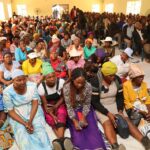President Emmerson Mnangagwa’s month-long annual leave, commencing this Tuesday, 31 December 2024, is marked by an unusual twist: while he’ll be taking a break, he’s pledged to remain within Zimbabwe’s borders.
This decision is further complicated by the unequal distribution of acting presidential responsibilities between his two Vice Presidents. Vice President Kembo Mohadi will enjoy a significantly longer stint as acting president than the powerful Vice President Constantino Chiwenga.
A statement released on Monday by Acting Chief Secretary to the President and Cabinet, George Charamba, outlined the arrangement: “His Excellency the President, Dr E.D Mnangagwa, starts his month-long annual vacation tomorrow, 31st December, 2024. He plans to spend his vacation in the country, and will be available for commitments requiring his personal attention, both as State President and as Chairman of the Southern Africa Development Community (SADC).”
The statement went on to detail the division of acting presidential duties, revealing the disparity: “While he is on leave, the two Vice Presidents, Hon K.C.D Mohadi, and Hon. Dr C.G.D.N Chiwenga, will stand in for him in that order. Vice President Mohadi will act from 31st December, 2024 to 19th January, 2025. Thereafter, Vice President Chiwenga will act until His Excellency the President resumes duty in early February.”
This arrangement grants Mohadi a 20-day tenure as acting president, considerably longer than Chiwenga’s 11-day period. The reason for this unequal distribution remains unexplained.
President Mnangagwa’s decision to forgo an overseas holiday, unlike his predecessor Robert Mugabe who frequently travelled to Thailand for his annual leave, is striking. This choice, combined with the uneven allocation of acting presidential responsibilities, has ignited speculation regarding the underlying political dynamics.
This development follows a period of heightened security concerns surrounding President Mnangagwa. He has faced criticism for alleged attempts to extend his tenure beyond the constitutionally mandated two terms.
This cancellation came after a helicopter crash-landing at an airstrip in Masvingo, where Mnangagwa was celebrating his 82nd birthday. Although he wasn’t on board, the incident amplified concerns about his security.
The unequal distribution of acting presidential powers, therefore, is viewed by many as a strategic move by President Mnangagwa to maintain a firm grasp on power, particularly given the perceived ambitions of Vice President Chiwenga and the existing security concerns.
The unusual arrangement underscores the intricate power dynamics within the ruling ZANU-PF party and the ongoing political struggles within Zimbabwe. The President’s decision to remain in the country throughout his leave further emphasises this perceived need for control and close monitoring of the political landscape.

Follow @MyZimbabweNews












